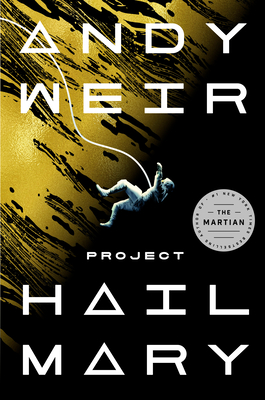Andy Weir’s Surprisingly Human Approach to Science Fiction
I started Project Hail Mary as a book club read and was cautiously optimistic. I had of course seen the tidal wave of good reviews and all the hype, magnified by the recent release of the upcoming movie’s trailer. But I always worry when any book is getting that much attention. The risk of over hype from people jumping in the “bandwagon” is something I’ve been burned by before. Luckily, this was not one of those times.
This was my first Andy Weir novel. I had heard about his work for years and of course seen The Martian with Mark Wahlberg, but never gotten around to reading his actual books. Now that I have, what struck me the most was his unique gift for infusing an undeniable sense of humanity into his science fiction story. Don’t get me wrong, as a writer Weir has many strengths. His passion for the science part of science fiction shines through on just about every page. His writing conveys a sense of technological wonder while still being extremely palpable, even to someone with zero scientific background like myself. He has a real knack for establishing a world that feels just a few years removed from our own, like we’re reading an account of something that might actually happen in about ten years. Pair this with his ability to create engaging yet flawed characters and maintain a steady, well structured story, Weir has a winning formula. It’s immediately plain to see where his success has come from.
But the most interesting aspect to his writing, and the one that took me by surprise, was just how human the story was. Weir’s focus on Dr. Ryland Grace, his primary protagonist, and the struggles that he goes through on both a personal and emotional level elevates his story to something truly special. Without relying on many of the staples of science fiction, such as grand spaceship battles, inexplicable interstellar travel and menacing overlords, Project Hail Mary is able to establish a sense of scale and tension that rivals the very best of space operas. By reducing his focus to the struggles of a man and his mission, Weir allows the plot to be propelled the main character’s self reflection and personal journey of development.
Throughout the book, Grace relies on his problem solving ability to deal with a series of ever worsening and complex tasks that put his mission at risk. Despite the fact that these are based mostly on complex, fictional science, they never ring hollow, get repetitive or feel without consequence. This is because each acts as a representation of his internal conflict. Weir impressively weaves the external story with Grace’s internal conflict, crafting something greater than either.
I would happily recommend this book to anyone. While there is a bit of “crunchiness” considering the science speak and space lingo, it more than bridges the divide with its strong focus on character development.
Full Spoiler Warnings For Project Hail Mary
Let’s get this out of the way immediately, Project Hail Mary is a self discovery story, masquerading as a first contact story, masquerading as a science fiction disaster movie. What starts out as fairly familiar premise, the earth is in trouble and a team of specialists must be sent on a last ditch effort to save humanity, quickly shifts into something far more interesting. When Grace discovering the alien Rocky about a third of the way into the book it immediately sets the stage for a much different story.
A writer trying to fit a more traditional genre mold might have used it as a spring board to launch the narrative into a series of tense interactions and space heroics befitting a classically heroic protagonist. But Grace is anything but a traditional hero. If anything, Weir uses the audiences familiarity with classic genre tropes to undercut expectations and present a story that is altogether unexpected. He presents Grace as a man who is heroic out of necessity and circumstance. His actions are not flashy, exciting or fun, but rather it is the type of methodical, thoughtful work that is so much more reflective of real life heroes.
Moreover, Grace’s relationship with Rocky is the sort of bonding that is based on mutual admiration and genuine connection. The fact that Grace, a man who is undeniably an outsider within his own species, forms his greatest friendship with an alien is indicative of Weir’s entire theme. We are witnessing a man change in front of our eyes, watching his beliefs and values shift. While they are comrades in a shared purpose, their mission to save their respective planets is clearly their driving factor. But when Rocky nearly dies saving Grace, it marks a major turning point in both the narrative and Grace’s own personal story. Both characters shift in their positions, placing greater and greater value on each other and their shared bond.
By the end of the book, we witness Grace, a man who would rather doom his entire race than sacrifice himself, knowingly choose to put himself into certain doom to save a single alien. Having Grace end his story living out his days on Rocky’s home world, ultimately finding happiness as he is embraced by a people that are not his own, is a masterful move of Weir’s part. It strikes a chord that resonates with the innate desires of all people to be accepted and to find their place.



